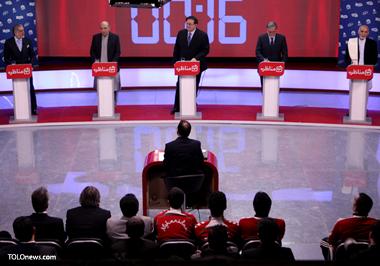Five Afghan presidential candidates participated in the first televised TOLOnews debate on Tuesday night, exchanging views on the country's security situation and politics ahead of the April vote.
The candidates went head-to head into testy exchanges during the debate, which touched on security, corruption, women's rights, and a military agreement between Kabul and Washington which would allow U.S. troops to remain in Afghanistan after the 2014 withdrawal.
The candidates answered questions for nearly two hours from moderator Mujahid Kakar.
Abdullah Abdullah, runner-up in the 2009 election, Qayoum Karzai, brother to current president Hamid Karzai, Ashraf Ghani Ahmadzai, ex-finance minister, Zalmai Rassoul, ex-foreign minister and Abdul Rahmi Wardak, former minister of defence participated in the debate. Six other presidential candidates will soon participate in a debate.
The security issues was the main point of the debate as the NATO foreign troops are to withdraw from Afghanistan by the end of the 2014 and the Afghan security forces will take over full security responsibility.
On security, Qayoum Karzai said his team "will focus on bringing security, fighting corruption and unemployment, which affects security."
Abdullah Abdullah said that "we need a clear policy for bringing peace; we need to empower people's role in security. Regionally, the biggest threat to peace is terrorist havens. Internationally, help, support for our troops."
"It is important to differentiate between peace and security. The Afghan National Security Forces (ANSF) capacity is good. We need more accountability. Promotions in ANSF should be merit-based; in funding our forces, we need transparency" said Ashraf Ghani-Ahmadzai.
Zalmai Rassoul said "security had 2 dimensions: external and internal." In addition to bringing external neighbors for peace, "we need to strengthen Afghan National Security Forces, who need better equipment."
"We need to improve air force to help solve logistical issues. We need to consolidate, synergize all forces and strong national security forces maintain security in Afghanistan as well as the region," said Abdul Rahim Wardak.
He added that "good governance, economic development, civil control, popular participation lead to security."
On peace talks with the Taliban, the candidates mostly shared the same views and all five support a negotiation with insurgents to lay down arms and cut ties with terrorist groups like al Qaeda.
While Ahamadzai condemned the killing of innocents and suicide attacks, he said some Taliban are "forced because of corruption and injustice to take up arms."
Asked if the Taliban are the enemy of Afghan people, Rassoul answered indirectly, saying that "those who burn our schools, who kill our children, who kill innocent people and kill our soldiers, they are the enemies."
Abdullah called for a clear peace process with the Taliban, but said "we should make it clear that if there are people who don't want peace, there is no other way than to face them."
Most of the audience of the debate also support the peace talks.
The audience poll results showed 29 percent support continued fight against Taliban, 41 percent support peace talks, and 29.4% support a joint government with Taliban.
The upcoming elections have been portrayed as a pivotal litmus test for Afghan democracy and the future direction of the country. For women's advocates, with the NATO coalition withdrawing by December, the most important progress to protect, and build upon, is that of women's rights and roles in Afghan society.
The other topics were the economy and how to fight corruption.
"There is no doubt that corruption is like a cancer in Afghanistan," Ghani-Ahmadzai said.
Mr. Ghani-Ahmadzai and Qayyum Karzai pledged to hold their governments accountable, while Wardak specifically called for streamlining bureaucracy and more financial auditing.
The Bilateral Security Agreement took center stage and all candidates expressed their support for signing the pact. President Karzai has so far refused to sign the agreement.
"The security forces and the people of Afghanistan will not have the ability to function on their own (without the BSA)," said Qayoum Karzai.
Of the roughly 80,000 foreign troops currently in Afghanistan, around 47,000 are Americans.



Comment this post